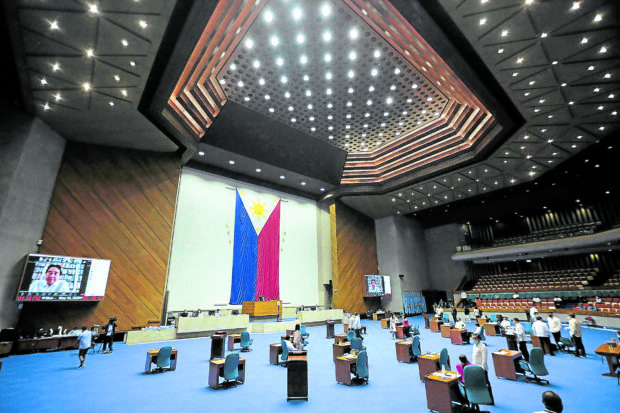
Plenary Hall of the House of Representatives. INQUIRER FILE PHOTO / GRIG C. MONTEGRANDE
MANILA, Philippines — The House ways and means committee on Monday approved in principle a substitute bill that would define the tax rates for proprietary schools to allow them to avail of the 10-percent preferential rate on taxable income.
Committee chair Rep. Joey Salceda said he was able to “secure from the BIR (Bureau of Internal Revenue) a commitment of support for the revision by legislation of the ambiguities in the law so that, one, they will be able to avail of the 1-percent tax rate up to 2023.”
The tax panel’s proposed amendment would subject for-profit private schools to the preferential corporate income tax rate of 10 percent, allow them to avail of the Corporate Recovery and Tax Incentives for Enterprises Act (CREATE) tax relief rate of 1 percent from July 2020 to June 2023, and expunge the liability to pay the regular corporate income tax from 2016, when the Supreme Court issued the decision.
Salceda said the tax rate would help private schools hire more teachers and keep their existing personnel.
He said private schools represented some 378,637 jobs, citing that the income tax increase, if made effective, represented about 5.72 percent of compensation income.
Savings for schools
He warned that “this would force the already dwindled private education labor force to shed another 21,661 jobs due to the tax rate adjustment alone.”
“On the other hand, applying the CREATE until 2023 would allow these schools to save an equivalent of 3.43 percent of compensation expenses, which could help them rehire at least 12,996 teachers at the start of the next school year,” he said.
Private school associations on Monday lauded the House for proposing bills that would amend the Tax Code and its definition of proprietary educational institutions, which could spell the survival of private schools amid the economic crisis triggered by the COVID-19 pandemic.
Additional amendments
At the hearing of the House ways and means committee, the Coordinating Council of Private Educational Associations (Cocopea) also proposed additional amendments to Section 27(B) of the National Internal Revenue Code of 1997 (Tax Code), such as the addition of the word “all” before “proprietary educational institutions” to include stock and for-profit private schools in the preferential tax treatment.
“We are glad that many of our legislators … have risen to set in motion the process of enacting a law that would leave no doubt and no room for conflicting interpretations as to the preferential tax rate for proprietary educational institutions,” said Joseph Noel Estrada, managing director of Cocopea.
Under the Tax Code, private schools are entitled to preferential tax treatment, which decreased corporate income tax from 25 percent to 10 percent.
On April 8, however, the BIR issued Regulation No. 5-2021 (RR 5-2021) that raised income tax on stock and for-profit private schools to 25 percent.
The BIR argued that the Tax Code only granted preferential tax treatment to nonprofit proprietary educational institutions and nonprofit hospitals.
Salceda authored House Bill No. 9596, which seeks to amend Section 27(B) of the Tax Code, while Rep. Mark Go filed House Resolution No. 1877, which urges the BIR to revoke RR 5-2021.
Estrada said many private schools resorted to downsizing and retrenching school personnel to prevent closures, while many had been “severely weakened and impacted” by the challenges of adapting to distance learning. INQ